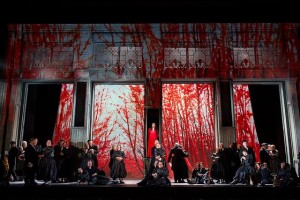
screening of performances in cinemas: the reduced price and multiple venues enable wider accessibility to a more diverse audience, it also softens the blow when you see a complete travesty and have avoided buying tickets at the Royal Opera House.
Tchaikovsky’s lyrical adaptation of Pushkin’s verse novel ‘Eugene Onegin’, directed by Kasper Holten at the ROH, carried great expectations. Sadly, Holten’s directorial debut became an unfortunate example of life reflecting art: naïve and chaotic, much like Tatyana’s impassioned and impulsive letter.
Holten expressed a desire to channel Tchaikovsky’s vision of a simple and direct performance, in contrast with the grand operas so popular in the 1870s. Whereas Pushkin’s novel is elaborate, highly-stylsed and embedded with textual references, Tchaikovsky’s interpretation is essentially reduced to romantic tragedy and the familiar pain of regret. Holten’s production emphasizes this focus on nostalgia and the power of memory. However, rather than maximizing its simplicity and sincerity, his decisions overcomplicate the lyrical opera.
As the performance lurches on, the stage is increasingly strewn with the wreckage of these memories: piles of novels belonging to the bookish young Tatyana; bales of hay representing their provincial youth in the country; snow lacing the surfaces; the large incumbent tree branch present at the duel, and the dead body of Lensky lying centre-stage, inert. These objects effectively signify the events that haunt Onegin’s mind and traumatise his present, though they also clutter the stage and interfere with the sleek minimalism of the set design.
The performance was saved by the endurance and magnificence of Tchaikovsky’s score, conducted by the young and energetic Robin Ticciati, leading the tremendous Orchestra. Pavol Breslik’s Lensky received the biggest applause, and rightly so. Equally captivating was Elena Maximova’s Olga, which suggests that casting doubles for Tatyana and Onegin was the show’s main downfall.
During the introduction, Holten inadvertently revealed what was perhaps the cause of his poor direction: ‘This opera has a very special place in my heart […] When you do a piece that you really love, it’s almost sometimes harder than when you do a piece that you find tricky.’